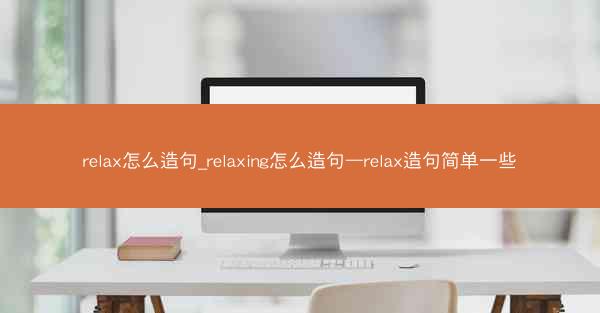relax怎么造句_relaxing怎么造句—relax造句简单一些
分类:帮助中心 | 发布时间:2025-04-02 03:00 | 来源:TG纸飞机中文版

在英语学习中,动词的运用是基础也是难点。今天,我们将探讨一个简单而又多变的动词——relax,以及它的形容词形式relaxing。通过了解relax和relaxing的多种造句方式,我们可以更好地掌握这个词汇,丰富我们的英语表达。
一、relax的基本用法
1. 休息放松
She decided to relax after a long day of work.(她在辛苦工作一天后决定休息放松。)
2. 放松肌肉
The massage helped to relax the muscles in her back.(按摩帮助她放松了背部的肌肉。)
3. 缓解紧张
The deep breaths helped him relax and ease his tension.(深呼吸帮助他放松并缓解紧张。)
4. 使某人放松
The gentle music relaxes me every time I listen to it.(每次听这首轻柔的音乐,我都会感到放松。)
5. 放弃抵抗
After the police explained the situation, he decided to relax his resistance.(在警察解释了情况后,他决定放弃抵抗。)
6. 使某物放松
The heat relaxes the joints and makes them more flexible.(热度使关节放松,使它们更加灵活。)
二、relaxing的形容词用法
1. 轻松愉快的
The book is a relaxing read, perfect for a lazy afternoon.(这本书读起来很轻松愉快,非常适合悠闲的午后。)
2. 令人放松的
The beach is a relaxing place to spend a sunny day.(海滩是一个在阳光明媚的日子里放松的好地方。)
3. 适合放松的
This chair is very relaxing; it's perfect for lounging.(这张椅子非常舒适,非常适合懒散地坐着。)
4. 舒缓的
The music is so relaxing; it helps me unwind after a long day.(音乐如此舒缓,它帮助我在漫长的一天后放松。)
5. 适合放松的
The spa offers a variety of relaxing treatments to help you unwind.(水疗中心提供多种放松的治疗,帮助你放松。)
6. 舒适的
The hotel room was very relaxing; the bed was comfortable and the view was beautiful.(酒店房间非常舒适;床很舒服,景色也很美。)
三、relax与relaxing的对比
1. 动词与形容词
Relax is a verb that means to make or become less tense or tight. Relaxing is an adjective that describes something that causes relaxation or is designed to be relaxing.(relax是一个动词,意味着使或变得不那么紧张或紧绷。relaxing是一个形容词,描述的是引起放松或设计用来放松的事物。)
2. 主动与被动
When we use relax, we often talk about the action of making something or someone less tense. When we use relaxing, we are describing something that has the quality of causing relaxation.(当我们使用relax时,我们通常谈论使某物或某人变得不那么紧张的动作。当我们使用relaxing时,我们是在描述具有引起放松特质的事物。)
3. 主语与宾语
In sentences with relax, the subject is usually the person or thing that is performing the action. In sentences with relaxing, the subject is often the thing that is causing relaxation.(在relax的句子中,主语通常是执行动作的人或物。在relaxing的句子中,主语通常是引起放松的事物。)
4. 语境差异
Relax is more commonly used in contexts where the focus is on the action of relaxing, such as in physical activities or mental exercises. Relaxing is used when describing the quality of something that is intended to relax people, such as in leisure activities or environments.(relax在强调放松动作的语境中更常用,如身体活动或心理练习。relaxing用于描述旨在放松人们的某物的特质,如休闲活动或环境。)
5. 情感色彩
Relax has a more neutral tone, often used in a practical sense. Relaxing has a more positive and pleasant connotation, suggesting a sense of well-being and contentment.(relax有一个更中性的语调,通常用于实用的意义上。relaxing有一个更积极和愉快的内涵,暗示着一种幸福和满足感。)
6. 语境搭配
Relax is often used with direct objects, such as relax your muscles or relax your mind. Relaxing is often used with nouns that describe things that can cause relaxation, such as a relaxing bath or a relaxing massage.(relax通常与直接宾语搭配使用,如放松你的肌肉或放松你的心情。relaxing通常与描述可以引起放松的事物名词搭配使用,如一个放松的浴缸或一个放松的按摩。)
我们可以看到relax和relaxing在英语中的多样运用。从基本用法到形容词用法,再到两者之间的对比,我们深入了解了这个词汇的多面性。掌握relax和relaxing的造句技巧,不仅能够丰富我们的英语表达,还能提高我们的语言运用能力。在今后的学习和交流中,让我们大胆地运用这个词汇,展现我们的英语魅力。
相关内容推荐:
- 2025-03-15 00:41telegeram官网下载-telegeram官网下载ios
- 2025-03-20 19:34telegram ios登录不了-telegram第一次登陆ios
- 2025-03-10 15:20Telegreat苹果手机注册攻略全解析
- 2025-03-06 17:36车牌号码尾号吉利数字表最新版、车牌尾数吉利数字
- 2025-04-01 07:49litter怎么读英语_mountain读什么英语、littering怎么读音发音英语
- 2025-03-06 19:56大量虚拟号码接收验证码平台官方—虚拟号码收取短信验证码平台
- 2023-01-29 04:06纸飞机苹果版怎么更换中文
- 2025-03-09 10:38Telegram X最新官网揭秘:功能升级,体验再升级
- 2025-03-06 03:26telegarm收不到验证码怎么登录_telegram无法收到短信验证
- 2025-04-01 05:22jeepspirit衣服为啥便宜_jeep为什么卖衣服_jeep衣服为啥这么便宜了
- 推荐阅读
- 最热文章
-
- chatgpt4.0怎么装windows10电脑上,pcattcp安装
- chatgpt4.0怎么装iphone、安装chattr
- chatgpt4.0怎么装iphone、chat怎么下载
- chatgpt4.0怎么装iphone(安装chattr)
- chatgpt4.0怎么装、cheto怎么安装
- chatgpt4.0怎么转化为中文;chatwork怎么修改语言
- chatgpt4.0怎么中文语音;cheat中文
- chatgpt4.0怎么中文语音;chat language
- chatgpt4.0怎么中文语音(chat application 中文怎么说)
- chatgpt4.0怎么中文对话-chat怎么样